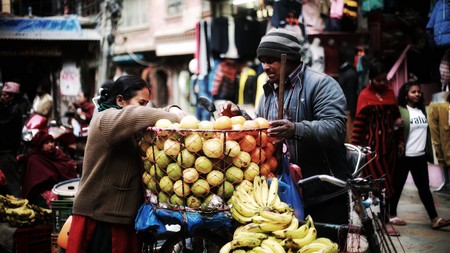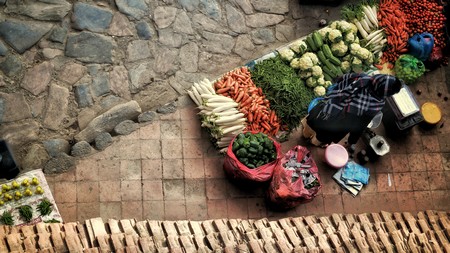Changing food choices to increase our chances of tackling global warming
Action to protect the planet against the impact of climate change will fall short unless we reduce greenhouse gas emissions from the global food system, which now make up a third of all man-made greenhouse gas emissions. The largest emission increase within food supply chains is triggered by beef and dairy consumption in rapidly developing countries, such as China and India. To mitigate climate change, consumers should be encouraged to choose less emissions-intensive food products.
These results are described in a paper by an international group of scientists led by the Universities of Groningen and Birmingham, which was published in Nature Food on 15 June. The scientists calculated the so-called consumer-based emissions, which allocate emissions from producers to final consumers, irrespective of the place of production. They did this for a total of 153 different food products in the food chain (both animal- and plant-based) in 181 countries or areas during the period 2000 – 2019.

Global population
Annual global greenhouse gas emissions associated with food increased by 14% (2 Gigaton CO2-equivalent) over the 20-year period. The substantial increase in consumption of animal-based products contributed about 95% of the global emissions rise, accounting for almost half of total food emissions. Beef and dairy contributed 32% and 46% of the increase in global animal-based emissions.
The United Nations projects that food production has to increase by 70 percent of the current levels to feed the world's estimated population of 9.1 billion by 2050. The implications are that the growth of the global population as well as rising demand for emission-intensive food are likely to boost emissions further. ‘A global shift in diets, including reducing excessive intake of red meat and improving shares of plant-based protein – will not only reduce emissions but avoid health risks such as obesity and cardiovascular disease’, says corresponding author Klaus Hubacek, Professor in Science, Technology and Society at the University of Groningen.
Another corresponding author, Dr Yuli Shan from the University of Birmingham, comments: ‘The agrifood system drives global land use and agricultural activities - contributing to around one-third of global anthropogenic greenhouse gas. Population growth, expansion of food production, and an increase in animal-based diets are likely to further increase emissions and squeeze the global carbon budget.’

Incentives
First author Yanxian Li, PhD student at the University of Groningen, adds that mitigating emissions at every stage of food supply chains from production to consumption is critical if we are to limit global warming. ‘However, widespread and lasting diet shifts are very difficult to achieve quickly, so incentives that encourage consumers to reduce red meat or to buy products with higher environmental dividends could help reduce food emissions.’
The researchers also note that a series of trade policies are accelerating emissions through increasing food imports from countries/regions with emission-intensive production – for example, while the EU’s Green Deal encourages less intensive agriculture in Europe, it thereby potentially increases imports of agricultural products from countries such as Brazil, USA, Indonesia, and Malaysia. This will lead to an increase in greenhouse gas emissions.
Reference: Yanxian Li, Honglin Zhong, Yuli Shan, Ye Hang, Dan Wang, Yannan Zhou and Klaus Hubacek: Changes in global food consumption increase GHG emissions despite efficiency gains along global supply chains. Nature Food, 15 June 2023
Text: University of Birmingham, University of Groningen
| Last modified: | 20 July 2023 1.27 p.m. |
More news
-
13 May 2024
Trapping molecules
In his laboratory, physicist Steven Hoekstra is building an experimental set-up made of two parts: one that produces barium fluoride molecules, and a second part that traps the molecules and brings them to an almost complete standstill so they can...
-
29 April 2024
Tactile sensors
Every two weeks, UG Makers puts the spotlight on a researcher who has created something tangible, ranging from homemade measuring equipment for academic research to small or larger products that can change our daily lives. That is how UG...
-
16 April 2024
UG signs Barcelona Declaration on Open Research Information
In a significant stride toward advancing responsible research assessment and open science, the University of Groningen has officially signed the Barcelona Declaration on Open Research Information.

